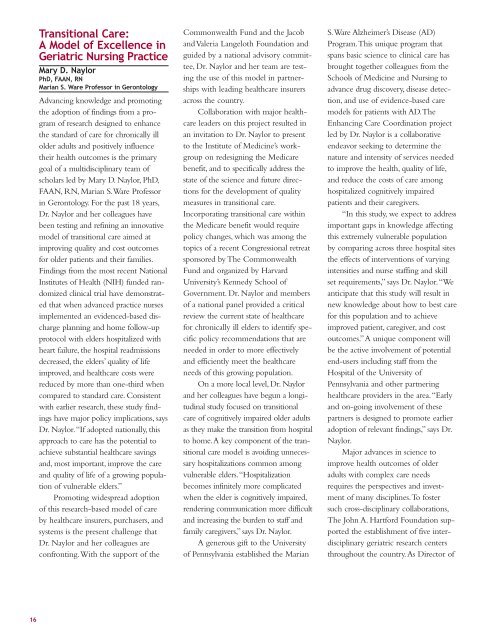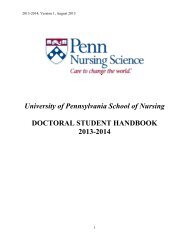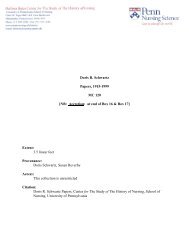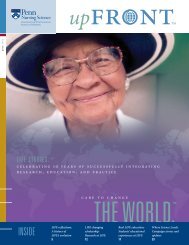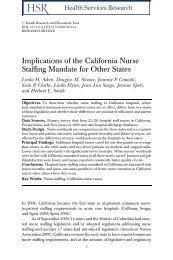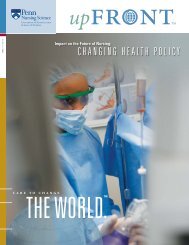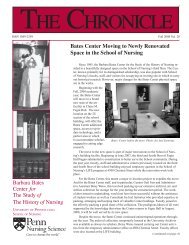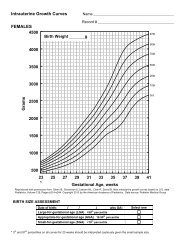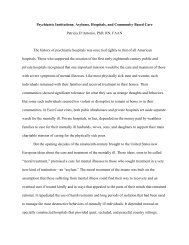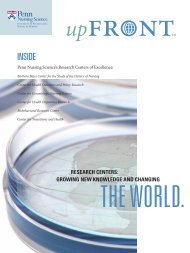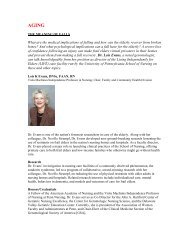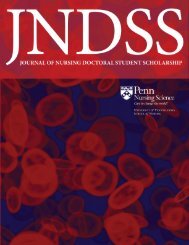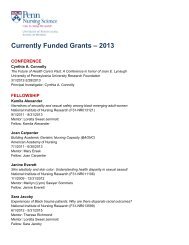Penn Nursing 090805_final_4c - University of Pennsylvania School ...
Penn Nursing 090805_final_4c - University of Pennsylvania School ...
Penn Nursing 090805_final_4c - University of Pennsylvania School ...
You also want an ePaper? Increase the reach of your titles
YUMPU automatically turns print PDFs into web optimized ePapers that Google loves.
Transitional Care:<br />
A Model <strong>of</strong> Excellence in<br />
Geriatric <strong>Nursing</strong> Practice<br />
Mary D. Naylor<br />
PhD, FAAN, RN<br />
Marian S. Ware Pr<strong>of</strong>essor in Gerontology<br />
Advancing knowledge and promoting<br />
the adoption <strong>of</strong> findings from a program<br />
<strong>of</strong> research designed to enhance<br />
the standard <strong>of</strong> care for chronically ill<br />
older adults and positively influence<br />
their health outcomes is the primary<br />
goal <strong>of</strong> a multidisciplinary team <strong>of</strong><br />
scholars led by Mary D. Naylor, PhD,<br />
FAAN, RN, Marian S.Ware Pr<strong>of</strong>essor<br />
in Gerontology. For the past 18 years,<br />
Dr. Naylor and her colleagues have<br />
been testing and refining an innovative<br />
model <strong>of</strong> transitional care aimed at<br />
improving quality and cost outcomes<br />
for older patients and their families.<br />
Findings from the most recent National<br />
Institutes <strong>of</strong> Health (NIH) funded randomized<br />
clinical trial have demonstrated<br />
that when advanced practice nurses<br />
implemented an evidenced-based discharge<br />
planning and home follow-up<br />
protocol with elders hospitalized with<br />
heart failure, the hospital readmissions<br />
decreased, the elders’ quality <strong>of</strong> life<br />
improved, and healthcare costs were<br />
reduced by more than one-third when<br />
compared to standard care. Consistent<br />
with earlier research, these study findings<br />
have major policy implications, says<br />
Dr. Naylor.“If adopted nationally, this<br />
approach to care has the potential to<br />
achieve substantial healthcare savings<br />
and, most important, improve the care<br />
and quality <strong>of</strong> life <strong>of</strong> a growing population<br />
<strong>of</strong> vulnerable elders.”<br />
Promoting widespread adoption<br />
<strong>of</strong> this research-based model <strong>of</strong> care<br />
by healthcare insurers, purchasers, and<br />
systems is the present challenge that<br />
Dr. Naylor and her colleagues are<br />
confronting.With the support <strong>of</strong> the<br />
Commonwealth Fund and the Jacob<br />
and Valeria Langeloth Foundation and<br />
guided by a national advisory committee,<br />
Dr. Naylor and her team are testing<br />
the use <strong>of</strong> this model in partnerships<br />
with leading healthcare insurers<br />
across the country.<br />
Collaboration with major healthcare<br />
leaders on this project resulted in<br />
an invitation to Dr. Naylor to present<br />
to the Institute <strong>of</strong> Medicine’s workgroup<br />
on redesigning the Medicare<br />
benefit, and to specifically address the<br />
state <strong>of</strong> the science and future directions<br />
for the development <strong>of</strong> quality<br />
measures in transitional care.<br />
Incorporating transitional care within<br />
the Medicare benefit would require<br />
policy changes, which was among the<br />
topics <strong>of</strong> a recent Congressional retreat<br />
sponsored by The Commonwealth<br />
Fund and organized by Harvard<br />
<strong>University</strong>’s Kennedy <strong>School</strong> <strong>of</strong><br />
Government. Dr. Naylor and members<br />
<strong>of</strong> a national panel provided a critical<br />
review the current state <strong>of</strong> healthcare<br />
for chronically ill elders to identify specific<br />
policy recommendations that are<br />
needed in order to more effectively<br />
and efficiently meet the healthcare<br />
needs <strong>of</strong> this growing population.<br />
On a more local level, Dr. Naylor<br />
and her colleagues have begun a longitudinal<br />
study focused on transitional<br />
care <strong>of</strong> cognitively impaired older adults<br />
as they make the transition from hospital<br />
to home.A key component <strong>of</strong> the transitional<br />
care model is avoiding unnecessary<br />
hospitalizations common among<br />
vulnerable elders.“Hospitalization<br />
becomes infinitely more complicated<br />
when the elder is cognitively impaired,<br />
rendering communication more difficult<br />
and increasing the burden to staff and<br />
family caregivers,” says Dr. Naylor.<br />
A generous gift to the <strong>University</strong><br />
<strong>of</strong> <strong>Penn</strong>sylvania established the Marian<br />
S.Ware Alzheimer’s Disease (AD)<br />
Program.This unique program that<br />
spans basic science to clinical care has<br />
brought together colleagues from the<br />
<strong>School</strong>s <strong>of</strong> Medicine and <strong>Nursing</strong> to<br />
advance drug discovery, disease detection,<br />
and use <strong>of</strong> evidence-based care<br />
models for patients with AD.The<br />
Enhancing Care Coordination project<br />
led by Dr. Naylor is a collaborative<br />
endeavor seeking to determine the<br />
nature and intensity <strong>of</strong> services needed<br />
to improve the health, quality <strong>of</strong> life,<br />
and reduce the costs <strong>of</strong> care among<br />
hospitalized cognitively impaired<br />
patients and their caregivers.<br />
“In this study, we expect to address<br />
important gaps in knowledge affecting<br />
this extremely vulnerable population<br />
by comparing across three hospital sites<br />
the effects <strong>of</strong> interventions <strong>of</strong> varying<br />
intensities and nurse staffing and skill<br />
set requirements,” says Dr. Naylor.“We<br />
anticipate that this study will result in<br />
new knowledge about how to best care<br />
for this population and to achieve<br />
improved patient, caregiver, and cost<br />
outcomes.”A unique component will<br />
be the active involvement <strong>of</strong> potential<br />
end-users including staff from the<br />
Hospital <strong>of</strong> the <strong>University</strong> <strong>of</strong><br />
<strong>Penn</strong>sylvania and other partnering<br />
healthcare providers in the area.“Early<br />
and on-going involvement <strong>of</strong> these<br />
partners is designed to promote earlier<br />
adoption <strong>of</strong> relevant findings,” says Dr.<br />
Naylor.<br />
Major advances in science to<br />
improve health outcomes <strong>of</strong> older<br />
adults with complex care needs<br />
requires the perspectives and investment<br />
<strong>of</strong> many disciplines.To foster<br />
such cross-disciplinary collaborations,<br />
The John A. Hartford Foundation supported<br />
the establishment <strong>of</strong> five interdisciplinary<br />
geriatric research centers<br />
throughout the country.As Director <strong>of</strong><br />
16


